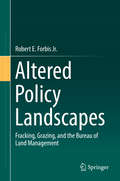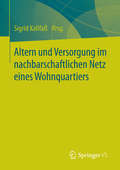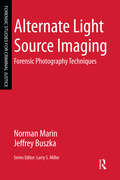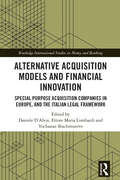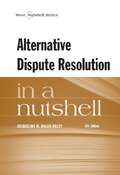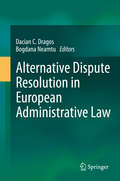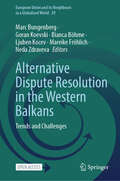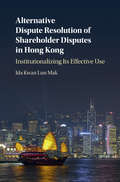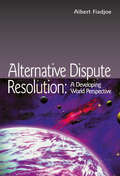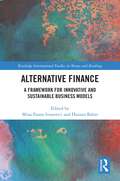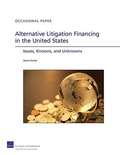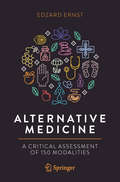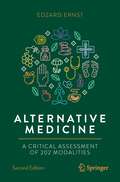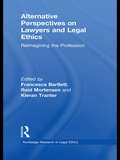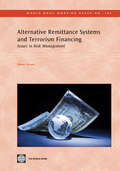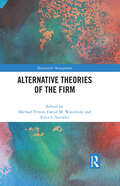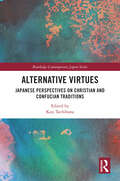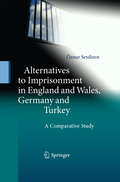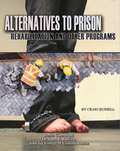- Table View
- List View
Altered Policy Landscapes: Fracking, Grazing, and the Bureau of Land Management
by Robert E. Forbis Jr.This book documents the United States Bureau of Land Management's (BLM) shift from a rancher-dominated agency to an energy-dominated agency. This shift is analyzed by identifying the conditions under which the expansion of hydraulic fracturing (fracking) in the Rocky Mountain West triggered a political conflict between ranching and energy stakeholder groups. Through scrutiny of federal actions and policies implemented by the Executive Branch between 2004 and 2010, the book sheds light on the emphasis of domestic energy production during this time period, and how the traditional ranching and energy alliance was split by shifting policy interests. The book is meant for policy makers, natural resource agencies, and students and researchers engaged in political science, public administration, and natural resource management. Chapter 1 introduces readers to the case study at hand, and reviews literature on public land agencies and policies. Chapter 2 summarizes the legal history of public land management by the federal government, and the conditions that caused the BLM to favor energy development over ranching in the mid-2000's. Chapter 3 details the role of the Executive Branch (Bush-Cheney administration) in affecting the BLM's domestic energy policies and resource allocation, and chapter 4 analyzes the role of subgovernments in affecting the BLM's motivations too. Chapters 5, 6 and 7 contain first-hand accounts from government officials, state petroleum associations, and ranching supported interest groups to explore the concept of subgovernment stakeholder domination in policymaking, and analyze the similarities and differences between different policy-making elites. Chapter 8 concludes the text by summarizing subgovernment theory, mapping the behaviors of subgovernment actors, and discussing the implications for future political appointees in the direction of land-management agencies like the BLM.
Altern und Versorgung im nachbarschaftlichen Netz eines Wohnquartiers: Zur Kooperation eines Altenhilfeträgers und einer Wohnbaugenossenschaft bei der quartiersbezogenen Gemeinwesenarbeit
by Sigrid KallfaßDiese Publikation beinhaltet die Ergebnisse des vom Bundesministeriums für Bildung und Forschung geförderten Projekts ,,Altern und Versorgung im nachbarschaftlichen Netz einer Wohnbaugenossenschaft". Die umfassende Studie liefert wichtige Aspekte zur Förderung einer Generationenbeziehung im nachbarschaftlichen Kontext.
Alternate Dispute Resolution Systems
by P. JaganathanThe Arbitration and Conciliation Act, 1996, aims to facilitate the resolution of disputes in international trade and commerce through streamlined and accessible means. It effectively promotes arbitration as a primary method of alternative dispute resolution, ensuring minimal court interference. By prioritizing efficiency and convenience, the Act provides a robust framework that supports the swift and fair settlement of commercial conflicts, aligning with global standards and enhancing the attractiveness of arbitration for international parties. This legislative approach underscores the commitment to fostering a favorable environment for international trade and commerce.
Alternate Light Source Imaging: Forensic Photography Techniques
by Norman Marin Jeffrey BuszkaAlternate Light Source Imaging provides a brief guide to digital imaging using reflected infrared and ultraviolet radiation for crime scene photographers. Clear and concise instruction illustrates how to accomplish good photographs in a variety of forensic situations. It demonstrates how tunable wavelength light sources and digital imaging techniques can be used to successfully locate and document physical evidence at the crime scene, in the morgue, or in the laboratory. The scientific principles that make this type of photography possible are described, followed by the basic steps that can be utilized to capture high quality evidentiary photographs.
Alternate Sides
by Marissa PiesmanNina's boyfriend is a murder suspect and she risks everything just to prove he is innocent.
Alternative Acquisition Models and Financial Innovation: Special Purpose Acquisition Companies in Europe, and the Italian Legal Framework (Routledge International Studies in Money and Banking)
by Yochanan Shachmurove Daniele D’Alvia Ettore Maria LombardiThis is the first book written in English on special purpose acquisition companies (SPACs) in the context of European and Italian financial law, introducing the topic with a general overview on the European stage. It is also the first book on European financial regulations of SPACs. As such, it is a groundbreaking reference text for SPAC studies at the international level. Alternative Acquisition Models and Financial Innovation: Special Purpose Acquisition Companies in Europe, and the Italian Legal Framework offers the most comprehensive overview of the current international financial regulations of SPACs in the EU and UK compared to the main legal system where SPACs originated—the US. This edited book is focused on finding a European legal framework for SPACs by discovering whether the Alternative Investment Fund Managers Directive (AIFMD) or the Undertakings for the Collective Investment in Transferable Securities Directive (UCITS) are applicable to them and why, as well as identifying the objectives of financial regulation of SPACs in the EU, US and UK. Essentially, the edited collection explores soft law and self-regulation instances against the state-based Westphalian approaches centred on hard law instances; describes practical examples of SPACs in Italy and Europe; and analyses the limits and perspectives of such investment vehicles on the Italian capital market as well as their possible uses as forms of shadow banking and venture companies at international levels.
Alternative Dispute Resolution In A Nutshell (Nutshells Ser.)
by Jacqueline Nolan-HaleyAlternative Dispute Resolution in a Nutshell (Nutshells) 4th Edition
Alternative Dispute Resolution in Energy Industries (Routledge Research in Energy Law and Regulation)
by Mustafa Oğuz TunaThe disputes that arise between host states and investors in the energy sector put a high number of valuable and vital projects in the countries at risk. Investment treaty arbitration mechanisms, as the traditional remedy, have provided a solution to these problems for decades. However, as the number of disputes increases, the sufficiency of arbitration in responding to disputes became questionable in addition to the long-lasting and costly cases. Accordingly, ADR mechanisms outside the arbitration cannon have triggered growing interest among practitioners. Despite the attraction and the apparent benefits of ADR such as being cheaper, faster and with better outcomes compared to arbitration, there are also hurdles in front that hinder the application of ADR. This has lead to the underuse of ADR in appropriate contexts. This study has been conducted to research the gap for the applicability of the ADR methods for investment disputes in the energy sector with the doctrinal analysis of the existing literature either promoting or opposing ADR. Its findings provide guidance for alternative dispute resolution practitioners on when to use ADR, how to use ADR and on what disputes ADR to be used to resolve conflicts in International Energy Investment.
Alternative Dispute Resolution in European Administrative Law
by Dacian C. Dragos Bogdana NeamtuThis book examines the role, the general framework and the empirical effectiveness of the main alternative dispute resolution tools (administrative appeals, mediation, and ombudsman) in administrative matters, within the broader context of the administrative justice system. The book uses approaches from the fields of law, public administration, public policy and political science to assess the importance of different instruments for alternative dispute resolution, with an emphasis on administrative appeals.
Alternative Dispute Resolution in the Western Balkans: Trends and Challenges (European Union and its Neighbours in a Globalized World #20)
by Marc Bungenberg Mareike Fröhlich Goran Koevski Bianca Böhme Ljuben Kocev Neda ZdravevaAlternative Dispute Resolution (ADR) is increasingly recognized as an attractive alternative to national court proceedings, especially in international business relations. This open access book focuses on ADR mechanisms in one specific geographical region: the Western Balkans. This region comprises Albania, Bosnia and Herzegovina, Croatia, North Macedonia, Montenegro, Kosovo, and Serbia. Although these countries generally have legal frameworks for ADR mechanisms in place, they remain largely underutilised in practice. Promoting ADR mechanisms in the countries of the Western Balkans could make them more attractive to foreign investors, thereby fostering economic growth. Additionally, the effective implementation of ADR mechanisms could have spill-over effects on national judiciaries, thereby increasing domestic rule of law standards. This would be highly beneficial for the Western Balkan countries, most of which are still aspiring to become Member States of the European Union (EU). To achieve this, they are required to promote the use of ADR mechanisms and align their legal frameworks with EU standards. Against this background, this book aims to explore the trends and challenges of ADR in the Western Balkans. The different chapters primarily focus on international commercial arbitration, investment treaty arbitration, and mediation. Some chapters address systemic challenges, such as capacity building and dispute prevention, which extend to the entire region. Others offer country-specific analyses of particular national framework. While some chapters adopt the perspective of international or EU law, others remain at the national level. Collectively, the wide diversity in topics and perspectives provides a comprehensive overview of the trends and challenges of ADR mechanisms in the Western Balkan.
Alternative Dispute Resolution of Shareholder Disputes in Hong Kong: Institutionalizing Its Effective Use
by Mak Ida Kwan LunThe landscape of shareholder dispute resolution in Hong Kong has changed vastly since the launch of the Civil Justice Reform in 2009. Key initiatives - the voluntary court-connected scheme and reform of the statutory unfair prejudice provisions - were employed to promote the greater use of alternative dispute resolution (ADR) in shareholder disputes. While the Hong Kong government and judiciary introduced such schemes to prove the legitimacy of extra-judicial over court-based litigation processes, their success is still uncertain. In this book, socio-legal theory and sociological institutionalism are used to develop a theoretical framework for analyzing the key stages of institutionalization. The author analyzes how procedural innovations could acquire legitimacy through different types of legal and non-legal inducement mechanisms within the institutionalization process. Recommendations on codifying and innovating ADR policy in Hong Kong shareholder disputes made with comparison to similar policies in the United Kingdom, South Africa and New Zealand.
Alternative Dispute Resolution: A Developing World Perspective (Commonwealth Caribbean Law)
by Albert FiadjoeThis book highlights the tremendous shift in the traditional arrangements for the delivery of civil justice in the Commonwealth Caribbean, from litigation to alternative dispute resolution (ADR) processes. Over the last quarter of a century, much learning has taken place on the topic of ADR and the literature on the subject is now voluminous. This book puts forward the thesis that the peculiar experiences of the developing world ought to help reshape our traditional notions of ADR. Furthermore, the impact of globalisation on the developing world has brought with it special and peculiar challenges to our notions of civil and criminal justice which are not replicated elsewhere. This book will appeal to a wide readership. The legal profession, students of law and politics, social scientists, mediators, the police, state officers and the public at large will find its contents of interest.
Alternative Finance: A Framework for Innovative and Sustainable Business Models (Routledge International Studies in Money and Banking)
by Mina Fanea-Ivanovici Hasnan BaberThe alternative financing space has grown exponentially in the last few decades, namely as a consequence of the financial crisis, technological advancement, niche customer segments, and more recently the pandemic. Now, with the inclusion of Fintech, online lenders, crowdfunding, accelerators, venture capitalists, or angel investors, this funding channel is no longer seen as a substitute for formal financing, but rather a core one. This book is a comprehensive guide to alternative financing methods, offering insights into emerging trends, the role of FinTech, and the intersection of finance with sustainability, innovation, and entrepreneurship.It fills a knowledge gap by exploring innovative financing channels such as fintech, green finance, and venture capital as well as other non-traditional ways of raising funds, which have become crucial for startups and businesses. It discusses the impact of financial technology (FinTech) on these methods and their function in supporting entrepreneurship and sustainable business, while also examining the implications of these technological advancements in the wider financial sector. It addresses challenges and opportunities for entrepreneurs and explores how alternative financing options can support growth and innovation, particularly in the context of environmentally and socially focused ventures, including how to integrate economic, social, and environmental considerations. The emphasis on sustainability and green finance aligns with the growing global concern for responsible business practices and the Sustainable Development Goals.While the primary audience for the book is scholars, researchers, and students, the inclusion of case studies, and the exploration of various financing options, extends practical cues for policymakers and practitioners and contributes to the understanding of how finance, entrepreneurship, and sustainability intersect in real-world business scenarios.
Alternative Litigation Financing in the United States
by Steven GarberAlternative litigation financing (ALF)--also known as "third-party" litigation financing--refers to provision of capital by parties other than plaintiffs, defendants, their lawyers, or defendants' insurers to support litigation-related activity. This paper describes the ALF industry as of early 2010 and discusses the legal ethics, social morality, and, especially, potential economic effects of ALF.
Alternative Medicine: A Critical Assessment of 150 Modalities
by Edzard ErnstAlternative medicine (AM) is hugely popular; about 40% of the US general population have used at least one type of alternative treatment in the past year, and in Germany this figure is around 70%. The money spent on AM is considerable: the global market is expected to reach nearly US $ 200 billion by 2025, with most of these funds coming directly out of consumers’ pockets. The reasons for this popularity are complex, but misinformation is certainly a prominent factor. The media seem to have an insatiable appetite for the subject and often report uncritically on it. Misinformation about AM on the Internet (currently about 50 million websites are focused on AM) is much more the rule than the exception. Consumers are thus being bombarded with misinformation on AM, and they are ill-protected from such misinformation and therefore prone to making wrong, unwise or dangerous therapeutic decisions, endangering their health and wasting their money. This book is a reference text aimed at guiding consumers through the maze of AM. The concept of the book is straightforward. It has two main parts. The first, short section provides essential background on AM, explaining in simple terms what is (and what is not) good, reliable evidence, and addressing other relevant issues like, for instance, the placebo response, informed consent, integrative medicine, etc. The second and main part consists of 150 short chapters, topically grouped and each dedicated to one single alternative therapeutic or diagnostic method. In each of them, seven critical points are raised. These points relate to issues that are important for consumers’ decisions whether it is worth trying the method in question. Restricting the discussion to just seven points means that issues must be prioritized to those themes which are most relevant in the context of each given modality.
Alternative Medicine: A Critical Assessment of 202 Modalities (Copernicus Books)
by Edzard ErnstAlternative medicine (AM) is popular; about 40% of the US general population have used alternative treatment in the past year, and in Germany this figure is around 70%. The global market is expected to reach nearly US $ 200 billion by 2025, with most of these funds coming directly out of consumers’ pockets. Consumers are bombarded with misleading and false information on AM and therefore prone to making wrong, unwise, or dangerous therapeutic decisions, endangering their health and wasting their money. This book is a reference text aimed at guiding consumers through the maze of AM. This second edition includes over 50 additional treatments as well as updates on many others.
Alternative Perspectives on Lawyers and Legal Ethics: Reimagining the Profession (Routledge Research in Legal Ethics)
by Francesca BartlettThe study of legal ethics and the legal profession has emerged as a distinct and important field of scholarship over the last 30 years. However, as in other disciplines, academic recognition can in turn entrench static and powerful meta-theories and narratives about professional ethos and practise, this collection seeks to disrupt this homogenising impulse and to present alternative voices by bringing together a range of international scholars writing about legal ethics and the legal profession. The book features significant and timely contributions which take contemporary and non-mainstream perspectives on the current and future shape of the legal profession. The essays not only describe the rapidly changing profession but canvas different approaches to scholarship on the legal profession. The collection seeks to explore a diverse and contextualised profession from a number of angles. Authors examine how the public sees lawyers and how lawyers see their own profession; how we practise law and how this practice shapes lawyers; how such cultural and professional practice intersects with institutional structures of the law to create certain legal outcomes; and how we regulate the legal profession to modify or institute ethical practice. The volume provides insights into legal culture and ethics from the perspective of authors from Australia, Canada, England, the United States, New Zealand and Kenya – a diversity of national perspectives that give valuable insights into developments in the profession at the local and global level. It also illustrates diversity within the profession by tracing differing professional career trajectories based on raced or gendered barriers, alternative ethical strategies and the impact of organisational cultures in which lawyers practice.
Alternative Remittance Systems and Terrorism Financing: Issues in Risk Mitigation
by Matteo VaccaniGovernments, through their regulatory bodies, typically regulate formal financial sector players such as banks, which can leave providers working in informal remittance systems outside regulatory channels. Value transfer services-financial transfers performed domestically or across borders on behalf of clients-are essential to the financial system, and as such, are often offered by both formal and informal actors. Law enforcement and counter-terrorism authorities are evaluating money and value transmission channels for vulnerabilities that may make these channels attractive for illicit use, including the financing of terrorism. 'Alternative Remittance Systems and Terrorism Financing: Issues in Risk Management' aims to help countries bring these informal alternative remittance systems into their counter-terrorism programs, without hindering the ability of those who depend on these systems to send and receive money at low cost.
Alternative Theories of the Firm (Humanistic Management)
by Michael PirsonThe Theory of the Firm is commonly viewed as axiomatic by business school academicians. Considerations spanning organizational structures, their boundaries and roles, as well as business strategies all relate to the theory of the firm. The dominant theory of the firm poses that markets act perfectly to maximize the well-being of society when people act to maximize the personal utility of their individual purchases and firms act to maximize financial returns to their owners. However, burgeoning evidence and discourse across the scientific and policy communities suggests that the economic, social, and environmental consequences of accepting and applying this theory in the organization of business and society threatens the survival of the human species, among countless others. This book provides the latest thinking on alternatives to the theory of the firm as cornerstone of managerial decision making. Authors explore and elucidate theories that help us understand a firm differently and suggest alternatives to the theory of the firm. This book will be of value to researchers, academics, practitioners, and students interested in leadership, strategic management, and the intersection of corporate interests and the wellbeing of society.
Alternative Virtues: Japanese Perspectives on Christian and Confucian Traditions (Routledge Contemporary Japan Series)
by Koji TachibanaIncorporating various perspectives on the Japanese notion of virtue, Alternative Virtues investigates and expands our current understanding of virtue and presents a foundational case study of an alternative approach to virtues.The study of virtue has long been dominated by Western (i.e., Christian) and far-Eastern (i.e., Confucian) points of view. However, Japanese thinkers and scholars have struggled with these traditions. The rise of cultural intermingling with these traditions has created a unique code of values in Japan, which have grown from their own historical and cultural sources other than the Christian and Confucian traditions. Viewed through the filter of Japanese history and culture as well as focusing on different contexts in Japan, the book investigates both moral and epistemic virtues. Discussing the theoretical and practical implications that such alternative virtues may have on our lives, this book will contribute to reforming the current research trends in virtue theory and encouraging the wider public to consider the notion of virtue from a fresh perspective.Due to the content and scope of the book, it will appeal to a variety of readers– both locally and internationally–interested not only in Japanese historical, cultural, and philosophical investigations of virtues but also in learning more about alternative perspectives on virtues. This readership includes scholars and university students (both undergraduate and postgraduate) in the fields of philosophy, history, cultural studies, moral psychology, and education.
Alternative Visions of the International Law on Foreign Investment
by C. L. LimThis book is about the forces that are reshaping the international law on foreign investment today. It begins by explaining the liberal origins of contemporary investment treaties before addressing a current backlash against these treaties and the device of investment arbitration. The book describes a long-standing legal-intellectual resistance to a neo-liberal global economic agenda, and how tribunals have interpreted various treaty standards instead. It introduces our reader to the changes now taking place in the design of a range of familiar treaty clauses, and it describes how some of these changes are now driven not only by developing and emerging economies but also by the capital-exporting nations. Finally, it explores the life, career and writings of Muthucumaraswamy Sornarajah, a scholar whose work has been dedicated to the realisation of many of these changes, and his views about the hold global capital has over legal practice.
Alternatives to Imprisonment in England and Wales, Germany and Turkey: A Comparative Study
by Öznur SevdirenThe book focuses on one of the most problematic areas of Turkish penal justice: the overreliance on custodial measures and a corresponding growth in the prison population, and compares Turkey with two major European countries in this respect: England and Wales and Germany. The underlying question throughout the study is the extent to which prison alternatives can be seen as genuine alternatives to immediate custodial sentences.
Alternatives to Prison: Rehabilitation and Other Programs
by Craig RussellIn 2003, there were almost seven million criminals in the United States. But only about two million of them were behind bars. In Alternatives to Prison, you'll learn why those other five million people are out on parole or probation. You'll also learn about: rehabilitation, community service, boot camps, day reporting, house arrest, and what the future may hold for other alternatives to prison.
Alternde Gesellschaft im Wandel: Zur Gestaltung einer Gesellschaft des langen Lebens (Schriften zu Gesundheit und Gesellschaft - Studies on Health and Society #4)
by Marcel Mertz Christiane Woopen Anna Janhsen Anna GenskeDas Buch untersucht die inhaltlichen und strukturellen Herausforderungen, vor der unsere Gesellschaft angesichts einer stetig steigenden Lebenserwartung und einer zunehmenden Vielfalt unterschiedlicher Lebensentwürfe steht. Sind wir vorbereitet auf die Bedürfnisse einer alternden Bevölkerung? Wie sollen wir auf den demografischen Wandel reagieren, um ein würdevolles Altern sicherzustellen? Wie müssen wir die unterschiedlichen Lebensbereiche wie Arbeitswelt, Gesundheitsversorgung, Wohnen und Kultur gestalten und anpassen, um den veränderten Lebensläufen gerecht zu werden? Entlang der Dimensionen Alterung, Diversität und Technisierung widmen sich in diesem Band Experten aus Medizin, Ethik, Recht, Sozialwissenschaften, Pädagogik, Kunstgeschichte und Gerontologie Möglichkeiten und Bedingungen des ‚guten Alterns‘ in einer Gesellschaft des langen Lebens.
Altersgerechte digitale Kanäle: Webseiten und mobile Apps (essentials)
by Alexander Seifert Alireza Darvishy Hans-Peter HutterWorauf müssen Sie als Auftrageber*in achten, wenn Sie eine altersgerechte Webseite oder eine mobile Applikation entwickeln lassen? Dieses Buch erklärt Ihnen, wie altersbedingte Einschränkungen sich auf die Nutzung von Webseiten und mobilen Applikationen auswirken. Wenn gerontologische Aspekte im Design von digitalen Kanälen nicht berücksichtigt sind, tendieren ältere Menschen dazu, auf das entsprechende Angebot zu verzichten. Deshalb müssen Webseiten und mobile Applikationen die Bedürfnisse älterer Menschen berücksichtigen. Im Buch finden Sie nützliche Empfehlungen, wie Sie dies tun können, damit Ihre Webseiten und mobilen Applikationen für alle leicht zu bedienen sind.
